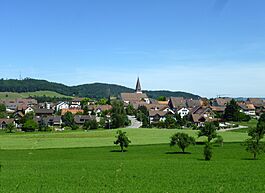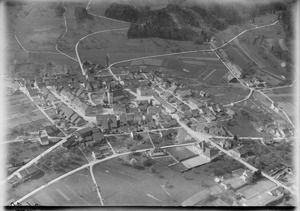Elgg facts for kids
Quick facts for kids
Elgg
|
||
|---|---|---|
 |
||
|
||
| Country | Switzerland | |
| Canton | Zurich | |
| District | Winterthur | |
| Area | ||
| • Total | 15.53 km2 (6.00 sq mi) | |
| Elevation | 530 m (1,740 ft) | |
| Highest elevation
(above Heurütiweiher)
|
825 m (2,707 ft) | |
| Lowest elevation | 494 m (1,621 ft) | |
| Population
(Dec 2020 )
|
||
| • Total | 4,960 | |
| • Density | 319.4/km2 (827.2/sq mi) | |
| Postal code |
8353
|
|
| Surrounded by | Aadorf (TG), Bertschikon bei Attikon, Elsau, Hagenbuch, Hofstetten bei Elgg | |
| Twin towns | Wenigzell (Austria), Mafi Kumase (Ghana) | |
Elgg is a town in Switzerland. It is a municipality in the Winterthur district. Elgg is located in the canton of Zurich. On January 1, 2018, the nearby town of Hofstetten joined with Elgg.
Contents
History of Elgg
Elgg is a very old settlement. It was first mentioned between the years 760 and 763. Back then, it was called Ailaghoga. Later, in 1166, it was known as Elgoue. By 1370, people started calling it Elggaw.
Äschli: A Special Custom
Äschli is a very old tradition in Elgg. It means "Ash Wednesday custom" in English. This tradition is over 500 years old! It happens every year on Ash Wednesday. The main event is a parade for boys.
The custom started a long time ago. It might have come from a time when soldiers or mercenaries from Elgg had to show up for training. No one knows the exact start date. But a church book from 1628 says the boys' parade was already a very old custom.
A group called the Aschermittwoch-Gesellschaft helps keep this tradition alive. This group was started in 1914. Today, it has about 650 members.
Every New Year's Day, young and old people gather. They meet at a place called Ober Tor. Here, the boys of Elgg, aged 5 to 16, choose their leader. They pick the "Äschlihauptmann" and the whole group by voting openly.
From New Year's Day until Ash Wednesday, the boys practice. They have exercises on Saturdays and Sundays.
Geography of Elgg
Elgg covers an area of about 15.6 square kilometers (6 square miles). A large part of this land, about 45.6%, is used for farming. Forests cover another big part, about 41.6%.
The rest of the land is built up. This means it has buildings or roads. About 12.3% of Elgg is settled land. A very small part, 0.6%, is non-productive. This includes rivers or mountains.
A famous building in Elgg is Elgg Castle. This castle is very important. It is a heritage site of national significance. This means it's a special place that helps tell the story of Switzerland.
People of Elgg
Elgg has a population of about 4,000 people. A small part of the population, about 12.8%, are people from other countries. Most people in Elgg speak German. It is the main language for about 90.8% of the people. Albanian is the second most common language, and Italian is third.
The population of Elgg has been growing. Over the last 10 years, it has grown by about 4.7%.
When it comes to age, about 24.7% of the people are children or teenagers (0-19 years old). Adults (20-64 years old) make up 59.6% of the population. Seniors (over 64 years old) are about 15.7%.
Many adults in Elgg have a good education. About 79.1% of people aged 25-64 have finished higher education. This includes university or special colleges.
Elgg has many jobs in different areas.
- The primary sector includes farming. About 104 people work in this area.
- The secondary sector includes factories and making things. About 471 people work here.
- The tertiary sector includes services like shops and offices. About 742 people work in this sector.
Most people in Elgg are either Protestant or Catholic. In 2008, there were about 1959 Protestants and 825 Catholics.
Here's how the population of Elgg has changed over time:
| year | population |
|---|---|
| 1467 | c. 440 |
| 1634 | 1,018 |
| 1792 | 2,103 |
| 1836 | 1,038 |
| 1850 | 1,182 |
| 1900 | 1,420 |
| 1950 | 2,184 |
| 2000 | 3,593 |
Transport
Elgg has its own Elgg railway station. This station is part of the Zürich S-Bahn train system. It is a stop on the S35 line. This makes it easy for people to travel to and from Elgg by train.
Notable People
Some famous people have connections to Elgg:
- Heinrich Schweizer-Sidler (1815–1894) was a Swiss expert in languages. He was born in Elgg.
- Bruno Wolfer (born 1954) is a former Swiss cyclist. He was born in Elgg.
- Jacqueline Fehr (born 1963) is a Swiss politician. She grew up in Elgg and is a member of the Swiss National Council.
See also
 In Spanish: Elgg (Zúrich) para niños
In Spanish: Elgg (Zúrich) para niños
 | Mary Eliza Mahoney |
 | Susie King Taylor |
 | Ida Gray |
 | Eliza Ann Grier |





